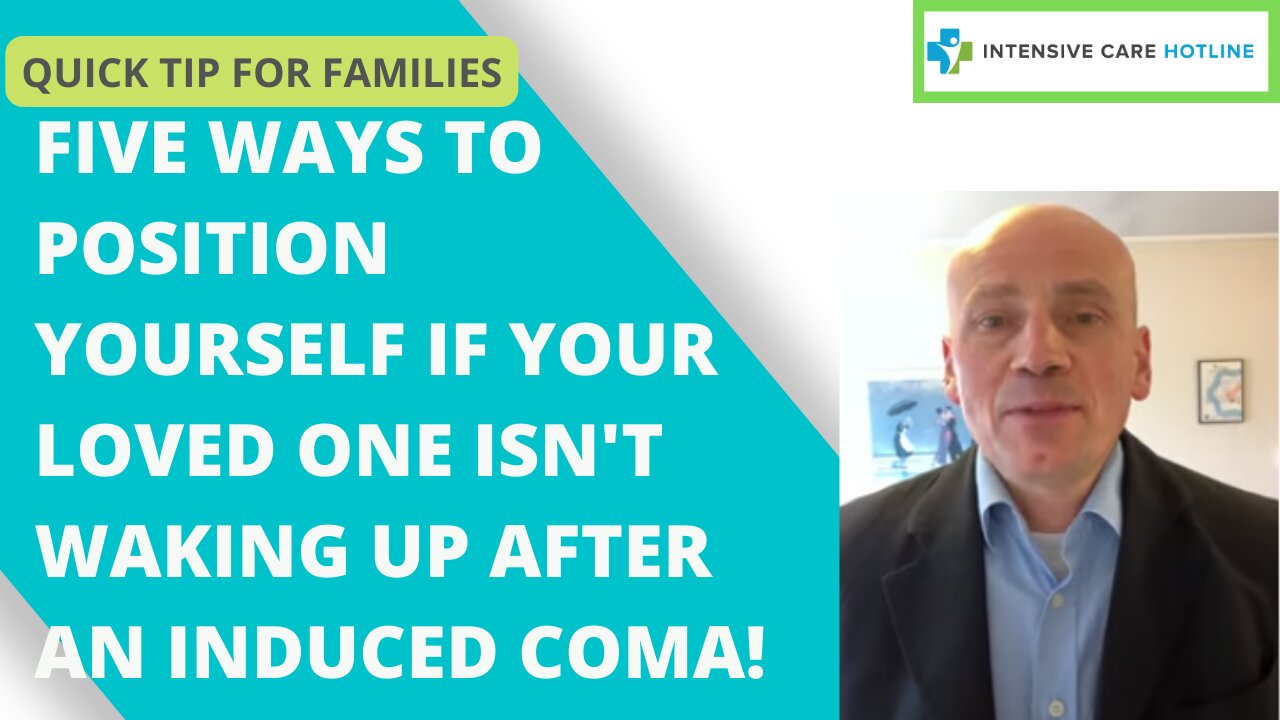Premium Only Content

Five ways to position yourself if your loved one isn’t waking up after an induced coma!
Quick tip for families in intensive care: 5 ways to position yourself if your loved one isn’t waking up after an induced coma!
Book your free 15 minute phone consultation here
http://intensivecarehotline.com/scheduling-appointment/
Call directly 24/7
+1 415-915-0090 USA/Canada
+44 118 324 3018 UK
+6141 094 2230 Australia
Email [email protected]
Get 1:1 consulting and advocacy
1:1 phone counselling
http://intensivecarehotline.com/one-on-one-counselling/
Become a member for families of critically ill Patients in Intensive Care
https://intensivecarehotline.com/intensivecaresupport-org-membership/
Immediate action steps http://intensivecarehotline.com/take-control-take-charge/immediate-action-steps/
https://intensivecareathome.com
And if you need a medical record review , click on the link and we can help you with reviewing your loved one’s medical records while they’re in ICU.
https://intensivecarehotline.thrivecart.com/review-of-medical-records/
Hi, it’s Patrik Hutzel from intensivecarehotline.com with another quick tip for families in intensive care.
Today’s tip is about, “Five ways that you need to position yourself if your loved one is in intensive care, in an induced coma, and is not waking up!”
So you might be wondering, why should I position myself if it’s my loved one that is not waking up? Well, it’s critical that you position yourself as an advocate for your critically ill loved one. And that you know what you’re talking about when you have a loved one in intensive care, because otherwise, the intensive care team will play yoyo with you. And because you don’t know what you’re up against, you don’t know the right questions to ask.
The biggest challenge for families in intensive care is that they don’t know what they don’t know. They don’t know what to look for. They don’t know what questions to ask. They don’t know their rights and they don’t know how to manage doctors and nurses in intensive care.
So, let’s dive right into it. Five ways you need to position yourself when your loved one is not waking up after an induced coma in intensive care.
Number one, it can take a lot of time to wake up after an induced coma, simply because of the nature of the critical illness, of the amount of sedatives, and the opiates the loved one had in intensive care. It can simply take a long time. There are no hard and fast rules for someone to wake up after an induced coma. It’s not as simple as, you switch off sedation and you switch off opiates now. And someone is awake within three hours, three days, three weeks, sometimes three months, no hard and fast rules.
Number two, when patients, after an induced coma wake up, as I said, it can take a long time. Sometimes patients with a head or brain injury, traumatic brain injury, and anoxic brain injury, they can take a long time to wake up after an induced coma. Sometimes, even for someone without a head or brain injury can take equally as long, even though they don’t have a head or brain injury. So don’t get discouraged, if it takes a long time. It just takes a long time. As long as other things are happening, such as physical therapy, I’ll come to that as a separate item, your loved one should be on their way to probably a slow recovery, but still a recovery.
Next number three, it depends on what sedatives or opiates your loved one has been on. For example, have they been on benzodiazepines, such as midazolam or Versed? They are long-acting sedatives. Whereas, if you take sedatives such as propofol, it is short-acting. That means if you stop propofol, someone should wake up. But even that is not guaranteed.
If someone is on midazolam or Versed for long periods of time, they may not wake up straight away because it’s a long-acting sedative. Also, benzodiazepine, such as midazolam or Versed, which is commonly used for an induced coma in intensive care, or for sedation, is addictive in nature. So that means, if they’ve been on maximum doses of midazolam or Versed, they’re coming out of the induced coma, they might now be addicted to the substance and they may need A) to go through withdrawal and B) they need to be slowly weaned off the sedative.
So that in and of itself can cause a delay in waking up. The same applies to fentanyl or morphine, which are opiates, and pain relief. They can be addictive in nature too, and they knock people out too. So, therefore, coming off the opiates such as fentanyl or morphine can take equally as long, because it makes people drowsy as well.
-
 14:12
14:12
Intensive Care Hotline
17 hours agoShould My Mom Go Home with Intensive Care at Home or Stay in ICU?
4 -
 LIVE
LIVE
LIVE WITH CHRIS'WORLD
3 hours agoLIVE WITH CHRIS’WORLS - J6 Pipe Bomber | Candace is NUTS | NBA Gambling Scandal | AND MUCH MORE!
228 watching -
 1:56:46
1:56:46
Redacted News
4 hours agoHIGH ALERT! Trump pushes "land war" in Venezuela, and Russia goes nuclear | Redacted News Live
124K82 -
 16:47
16:47
Robbi On The Record
3 hours ago $1.92 earnedThe Day Seeing Stopped Meaning Believing | Sora, AI and the Uncanny Valley
14.7K18 -
 9:54
9:54
Dr. Nick Zyrowski
1 day agoDoctors Got It Wrong! What High Cholesterol REALLY Means...
14.5K3 -
 LIVE
LIVE
Tundra Tactical
3 hours ago $1.73 earnedProfessional Gun Nerd Plays Battlefield 6
126 watching -
 1:06:06
1:06:06
vivafrei
5 hours agoAnother Illegal Alien Kills Americans! Candace Owens Promises to Violate Kirk Gag Order? & MORE!
131K36 -
 1:42:30
1:42:30
The Quartering
6 hours agoTrump Blamed For NBA Rigging Scandal, Major X Change Renders Site Useless, Church Nonsense
149K47 -
 4:18:11
4:18:11
MattMorseTV
7 hours ago $54.02 earned🔴Trump makes URGENT ANNOUNCEMENT.🔴
93.9K92 -
 12:05
12:05
Clintonjaws
11 hours ago $10.74 earnedPortland ICE Rioters Getting Arrested - This Is Priceless!
56.7K27